Nelson Capital Management


The world is anxiously awaiting a vaccine to stop the spread of SARS CoV-2, the virus that causes the disease COVID-19. Scientists have been working with unprecedented speed to develop a vaccine, as there is yet no definitive treatment that can cure this disease.
There are several different types of vaccines. One type uses the whole inactivated virus, which is unable to infect the body’s cells but can still elicit an immune response. The measles, mumps and rubella (MMR) vaccine is an example that has been used for many years. Chinese company CanSino is developing a COVID-19 vaccine of this type that is currently in clinical trials. Other companies are working on gene-based vaccines, which use only a small fraction of the virus. Moderna (tkr: MRNA), AstraZeneca (tkr: AZN), in collaboration with Oxford in England, and Johnson and Johnson (tkr: JNJ) are all researching this type of approach.
 Once a vaccine candidate is manufactured, it must be tested in three phases. In the first phase, a small group of healthy people is vaccinated then tested for an immune response and observed for side effects. In phase 2, more people across a broader spectrum of ages receive the vaccine. In phase 3, thousands of people are vaccinated and the rate of infection in this group is compared to a non-vaccinated group. Phase 3 testing for several COVID-19 vaccines is anticipated to begin later this summer. Previous vaccines have taken many years to come to market. The mumps vaccine took four years—at the time, a new record for speed of development.
Once a vaccine candidate is manufactured, it must be tested in three phases. In the first phase, a small group of healthy people is vaccinated then tested for an immune response and observed for side effects. In phase 2, more people across a broader spectrum of ages receive the vaccine. In phase 3, thousands of people are vaccinated and the rate of infection in this group is compared to a non-vaccinated group. Phase 3 testing for several COVID-19 vaccines is anticipated to begin later this summer. Previous vaccines have taken many years to come to market. The mumps vaccine took four years—at the time, a new record for speed of development.
Still, important questions remain. Will a COVID-19 vaccine last a lifetime, or will people need an annual shot, as with influenza? Will people need a “booster” a month after the first shot? Will the antibodies induced by the vaccine be protective against the disease or just decrease the severity of disease? Furthermore, there are the logistical challenges of manufacturing, distributing, and administering billions of doses of vaccine. This is one major reason that experts are giving a best-case timeline of 12 to 18 months.
We have elected not to chase Moderna, or to invest in any of the other big pharmaceutical companies working on vaccines. Due to the humanitarian nature of this issue, it is highly likely that vaccines will be either given away or sold at very modest prices, at least initially. Inventing a vaccine, therefore, will be a wonderful achievement, but not one that will move the revenue needle for Johnson and Johnson, AstraZeneca or Pfizer. Our portfolio currently includes GlaxoSmithKline (tkr: GSK), which produces adjuvants (substances that help boost the immune response) for vaccines. We believe our holdings in Illumina (tkr: ILMN) (sequencing the virus), Thermo Fisher (tkr: TMO) (testing and supplies), Gilead (tkr: GILD) (remdesivir for treatment of hospitalized COVID-19 patients) and Glaxo together provide balanced investment exposure without betting on one specific type of vaccine or that one particular company will be successful in its quest to make and manufacture an effective vaccine.
Individual investment positions detailed in this post should not be construed as a recommendation to purchase or sell the security. Past performance is not necessarily a guide to future performance. There are risks involved in investing, including possible loss of principal. This information is provided for informational purposes only and does not constitute a recommendation for any investment strategy, security or product described herein. Employees and/or owners of Nelson Roberts Investment Advisors, LLC may have a position securities mentioned in this post. Please contact us for a complete list of portfolio holdings. For additional information please contact us at 650-322-4000.
Receive our next post in your inbox.